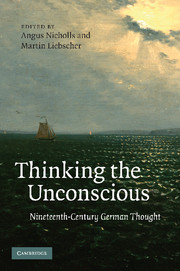Book contents
- Frontmatter
- Contents
- Notes on contributors
- Introduction: thinking the unconscious
- 1 The unconscious from the Storm and Stress to Weimar classicism: the dialectic of time and pleasure
- 2 The philosophical significance of Schelling's conception of the unconscious
- 3 The scientific unconscious: Goethe's post-Kantian epistemology
- 4 The hidden agent of the self: towards an aesthetic theory of the non-conscious in German romanticism
- 5 The real essence of human beings: Schopenhauer and the unconscious will
- 6 Carl Gustav Carus and the science of the unconscious
- 7 Eduard von Hartmann's Philosophy of the Unconscious
- 8 Gustav Theodor Fechner and the unconscious
- 9 Friedrich Nietzsche's perspectives on the unconscious
- 10 Freud and nineteenth-century philosophical sources on the unconscious
- Epilogue: the “optional” unconscious
- Works cited
- Index
- References
10 - Freud and nineteenth-century philosophical sources on the unconscious
Published online by Cambridge University Press: 04 August 2010
- Frontmatter
- Contents
- Notes on contributors
- Introduction: thinking the unconscious
- 1 The unconscious from the Storm and Stress to Weimar classicism: the dialectic of time and pleasure
- 2 The philosophical significance of Schelling's conception of the unconscious
- 3 The scientific unconscious: Goethe's post-Kantian epistemology
- 4 The hidden agent of the self: towards an aesthetic theory of the non-conscious in German romanticism
- 5 The real essence of human beings: Schopenhauer and the unconscious will
- 6 Carl Gustav Carus and the science of the unconscious
- 7 Eduard von Hartmann's Philosophy of the Unconscious
- 8 Gustav Theodor Fechner and the unconscious
- 9 Friedrich Nietzsche's perspectives on the unconscious
- 10 Freud and nineteenth-century philosophical sources on the unconscious
- Epilogue: the “optional” unconscious
- Works cited
- Index
- References
Summary
Introduction
In The Interpretation of Dreams (Die Traumdeutung, 1900) Freud introduced what he called “the unconscious” (das Unbewusste) as the fundamental term of psychoanalysis. From this time onwards, Freud continually emphasized that his teachings were essentially a form of psychology which takes this “object” (i.e. the unconscious) to be its primary subject matter. As is well known, Freud then began to research the dynamics of the unconscious in the clinical context by researching and interpreting hysteria and dreams. Of key importance was the discovery that in internal psychic conflicts, embarrassing, distateful and unpleasurable mental contents are repelled (abgewehrt) and repressed (verdrängt). Under unfavorable circumstances, according to Freud, those repressed elements of the subject that are not integrated within the ego increasingly slip away from conscious control and can potentially develop into causes of mental disturbance. By contrast, the uncovering of repressions would, argued Freud, have a liberating and curing effect. As Freud later remarked, he arrived at the term “unconscious” through his teachings on repression: “the repressed is the prototype of the unconscious for us.”
In order to establish the scientific nature of his new path for psychology, Freud went beyond clinical psychology and began to focus on a more general theory of the psyche. He refers to this general theory as a metapsychology, a definition designed clearly to differentiate this form of psychology from metaphysics. As an empirical researcher, Freud credited himself with having found new methodological and clinical ways of studying the unconscious via psycho-therapeutic experiences.
- Type
- Chapter
- Information
- Thinking the UnconsciousNineteenth-Century German Thought, pp. 261 - 286Publisher: Cambridge University PressPrint publication year: 2010
References
- 9
- Cited by



